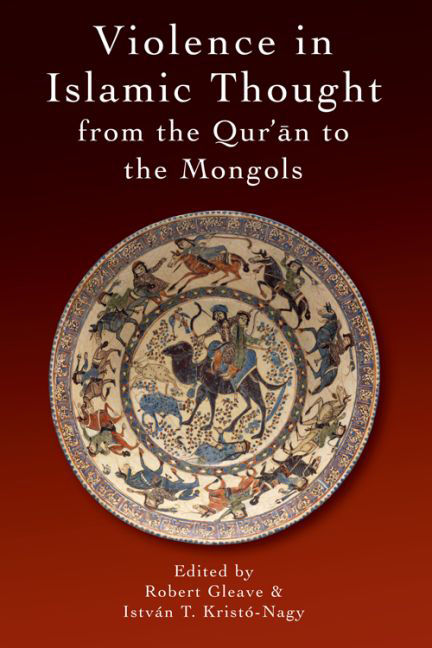Book contents
- Frontmatter
- Contents
- Dates and Abbreviations
- List of Figures and Tables
- 1 INTRODUCTION
- PART I JIHĀD AND CONQUEST: ATTITUDES TO VIOLENCE AGAINST THE EXTERNAL ENEMIES OF THE MUSLIM COMMUNITY
- PART II THE CHALLENGED ESTABLISHMENT: ATTITUDES TO VIOLENCE AGAINST THE STATE AND IN ITS DEFENCE WITHIN THE MUSLIM COMMUNITY
- PART III LUST AND FLESH: ATTITUDES TO VIOLENCE AGAINST THE DEFENCELESS, INTRA-COMMUNITARIAN VIOLENCE BY NON-STATE ACTORS
- 10 VIOLENCE AGAINST WOMEN IN ANDALUSI HISTORICAL SOURCES (THIRD/NINTH–SEVENTH/THIRTEENTH CENTURIES)
- 11 SEXUAL VIOLENCE IN VERSE: THE CASE OF JITHIN, AL-FARAZDAQ'S SISTER
- 12 BANDITS
- 13 EATING PEOPLE IS WRONG: SOME EYEWITNESS ACCOUNTS OF CANNIBALISM IN ARABIC SOURCES
- 14 ANIMALS WOULD FOLLOW SHĀFIISM: LEGITIMATE AND ILLEGITIMATE VIOLENCE TO ANIMALS IN MEDIEVAL ISLAMIC THOUGHT
- Bibliography
- Index of Qurānic Citations
- General Index
14 - ANIMALS WOULD FOLLOW SHĀFIISM: LEGITIMATE AND ILLEGITIMATE VIOLENCE TO ANIMALS IN MEDIEVAL ISLAMIC THOUGHT
from PART III - LUST AND FLESH: ATTITUDES TO VIOLENCE AGAINST THE DEFENCELESS, INTRA-COMMUNITARIAN VIOLENCE BY NON-STATE ACTORS
Published online by Cambridge University Press: 15 September 2017
- Frontmatter
- Contents
- Dates and Abbreviations
- List of Figures and Tables
- 1 INTRODUCTION
- PART I JIHĀD AND CONQUEST: ATTITUDES TO VIOLENCE AGAINST THE EXTERNAL ENEMIES OF THE MUSLIM COMMUNITY
- PART II THE CHALLENGED ESTABLISHMENT: ATTITUDES TO VIOLENCE AGAINST THE STATE AND IN ITS DEFENCE WITHIN THE MUSLIM COMMUNITY
- PART III LUST AND FLESH: ATTITUDES TO VIOLENCE AGAINST THE DEFENCELESS, INTRA-COMMUNITARIAN VIOLENCE BY NON-STATE ACTORS
- 10 VIOLENCE AGAINST WOMEN IN ANDALUSI HISTORICAL SOURCES (THIRD/NINTH–SEVENTH/THIRTEENTH CENTURIES)
- 11 SEXUAL VIOLENCE IN VERSE: THE CASE OF JITHIN, AL-FARAZDAQ'S SISTER
- 12 BANDITS
- 13 EATING PEOPLE IS WRONG: SOME EYEWITNESS ACCOUNTS OF CANNIBALISM IN ARABIC SOURCES
- 14 ANIMALS WOULD FOLLOW SHĀFIISM: LEGITIMATE AND ILLEGITIMATE VIOLENCE TO ANIMALS IN MEDIEVAL ISLAMIC THOUGHT
- Bibliography
- Index of Qurānic Citations
- General Index
Summary
The fact that Islam allows humans to consume meat and obtain several services from nonhuman animals is prevalently interpreted as a sign of anthropocentrism. For example, G. H. Bousquet considers that God created other animals to serve humans, thus suggesting that nonhuman animals have little or no intrinsic value in Islam. Carol Bakhos, Mohammed Hocine Benkheira and many others subscribe to the same opinion. The aim of this chapter is not to contest this view altogether, but to argue that the supposed anthropocentric character of Islamic tradition has been overemphasised at the expense of the theocentric one. Anthropocentrism is, of course, a ‘sin’, of which all human societies seem to be guilty. Nevertheless, to the extent that one can discern from medieval Islamic texts, the anthropocentric tendencies of pre-modern Muslim societies were often held in check by the equally, if not more important, theocentric character of the tradition. This approach resulted in genuine respect and serious engagement with nonhuman animals’ interests. The question of legitimate and illegitimate violence is well situated to illustrate this point. Thus, as I investigate how some Muslim scholars justified and categorised acts of force against animals, I will also assess the extent to which anthropocentric presuppositions shaped Muslims’ attitudes toward other animals.
PRELIMINARY REMARKS: ANIMALS’ SPIRITUAL AND PHYSICAL NATURE
Islam's textual sources, the Qurān and the Ḥadīth, are mostly concerned with humans’ character and destiny, even while reflecting the view that the majority of humankind are disbelievers on one hand and emphasising the spiritual nature of the nonhuman creation on the other. This seeming paradox notwithstanding, the attribution of spirituality to other creatures still carries great weight. Nonhuman animals’ perceived spirituality is, in fact, often invoked as a foundational principle for their ethical treatment. It is, for example, reported that the Prophet once admonished a group of people whom he saw engaging in idle talk while sitting on the backs of their riding mounts, explaining that these animals may be better than their riders, as they may remember God more frequently. From this ḥadīth, one discerns a theocentric outlook (it is due to their remembrance of God that animals deserve respect and consideration), which serves both to elevate the status and delegitimise a form of abuse against these animals.
- Type
- Chapter
- Information
- Violence in Islamic Thought from the Qur'an to the Mongols , pp. 225 - 244Publisher: Edinburgh University PressPrint publication year: 2015



